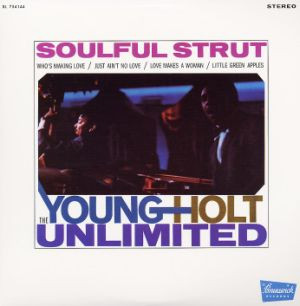 Young-Holt Unlimited, featuring Eldee Young and Isaac 'Red' Holt, creators of the iconic soulful strut song, performing live.
Young-Holt Unlimited, featuring Eldee Young and Isaac 'Red' Holt, creators of the iconic soulful strut song, performing live.
In 1968, amidst a vibrant musical landscape, “Soulful Strut” emerged as a refreshing instrumental track that resonated deeply with audiences. To this day, this iconic song by Young-Holt Unlimited remains a timeless classic, celebrated for its infectious groove and uplifting melody. It stands as a testament to the power of instrumental music to transcend genres and generations.
The story of “Soulful Strut” is intertwined with the journey of Eldee Young (bass) and Isaac “Red” Holt (drums), two accomplished musicians who honed their skills as the rhythm section for the renowned Ramsey Lewis Trio. After a decade of performing with Lewis and achieving significant success, including the hit song “The In Crowd,” Young and Holt ventured out to establish their own jazz ensemble. Initially named The Young-Holt Trio, with pianist Don Walker, they achieved moderate success, including a Top 20 R&B hit with “Wack Wack.”
Seeking a more contemporary sound and aiming to connect with a younger audience, Young and Holt underwent a transformation in 1968. They replaced Walker with Ken Chaney and rebranded themselves as Young-Holt Unlimited. This shift marked a pivotal moment that would soon lead to their greatest musical achievement.
Interestingly, “Soulful Strut,” the song that would define their career, began its life as the backing track for “Am I The Same Girl,” a lesser-known vocal tune by soul singer Barbara Acklin. Acklin, a Chicago-based artist and the wife of songwriter Eugene Record, had her own string of hits and is also recognized for co-writing The Chi-Lites’ massive hit, “Have You Seen Her.” “Am I The Same Girl,” penned by Eugene Record and Sonny Sanders, achieved modest chart success for Acklin, reaching #33 on the R&B chart and #79 on the Pop chart.
The transformation of “Am I The Same Girl” into “Soulful Strut” was the brainchild of Brunswick Records producer Carl Davis. Recognizing the captivating quality of the instrumental backing track, Davis made the ingenious decision to remove Acklin’s vocals and release it as a standalone piece. To enhance the instrumental version, Floyd Morris contributed a memorable piano solo, replacing the vocal melody. The newly christened “Soulful Strut” was released as an instrumental single, preceding Acklin’s original vocal version. The instrumental resonated instantly, soaring to the #3 position on both the R&B and pop charts, eclipsing the success of the vocal version it originated from.
Despite being credited to Young-Holt Unlimited, a persistent rumor suggests that neither Young nor Holt actually performed on the recorded track of “Soulful Strut.” Instead, it is believed that the session musicians at Brunswick Records were responsible for the instrumental performance. Intriguingly, several other tracks on Young-Holt Unlimited’s Soulful Strut album, including “Please Sunrise,” “Love Makes A Woman,” and “Just Ain’t No Lovin’,” were also reportedly derived from Barbara Acklin backing tracks.
While “Am I The Same Girl” itself had a life beyond Acklin’s version, with covers by Dusty Springfield and Swing Out Sister achieving minor chart placements (Swing Out Sister’s version even topped the adult contemporary charts), “Soulful Strut” carved its own unique path as an instrumental standard. George Benson covered “Soulful Strut” in 1979, and Grover Washington Jr. followed suit in 1996, further solidifying its status. The song’s infectious rhythm and melody also made it a popular choice for sampling, with artists like 2 Live Crew and The Beastie Boys incorporating elements of “Soulful Strut” into their own tracks. More recently, Joss Stone reimagined the instrumental as the foundation for her 2005 song “Don’t Cha Wanna Ride,” demonstrating the song’s enduring appeal and adaptability across genres.
“Soulful Strut” remains more than just a catchy tune; it’s a cultural touchstone and a testament to the enduring power of instrumental music. Its journey from a vocal backing track to an iconic instrumental hit highlights the serendipitous nature of musical creation and the timeless appeal of a truly soulful groove.


